Photographs: Genie Lemieux-Jordan/Evanston Photographic Arthur J Pais
Dipak C Jain took a small cookie and, using his hands, cut it into small bits while remembering his mother.
"At times, she used to cut a laddu or something she really liked into the smallest pieces and offer them to guests," he laughed.
"It used to be like this: There are guests and she has given them something to eat. But she finds there is just one small thing in the house which is delicious. She wants to share it with the guests. And the only way she can do it is cut it so small that everyone gets a bite."
"We used to feel quite embarrassed by our mother's action. We used to tell her, 'Ma, the guests may feel insulted that you are giving them such small bits' -- but she used to smile and tell us, 'They know it is coming from my heart'."
Dr Dipak Jain, 52, has stepped down as Dean of the prestigious Kellogg School of Management. Jain, who is also a director of major corporations like Deere, was Sandy and Morton Goldman Professor of Entrepreneurial Studies and Professor of Marketing at Kellogg, Northwestern University, and has been with Kellogg since 1986. Having stepped down as dean, he has gone back to teaching full time at the school.
At Kellogg, Jain's energy is an urban legend. Ever on the move, he doesn't need more than five hours of sleep. "My wife thinks something is wrong if I sleep more than that," he says.
'An idea without action is an abortion'
Image: Dipak, with his parents and younger brother.Industry leaders marvel at his stamina. Mel Bergstein, CEO, DiamondCluster, who visited India with Jain not so long ago, told Kellogg World: 'We covered four cities in three days. Vintage Dean Jain. I'm not sure he needs to sleep. He was tour guide, raconteur, travel agent, facilitator, insightful adviser and rock star -- all rolled into one. He gets enormous adulation among the business and academic communities in India, so when you travel with him you get a lot of attention.'
Roxanne Hori, Kellogg School assistant dean and director of the Career Management Center, said: 'Traveling with Dean Jain is not for the faint of heart.'
Over three sessions of interviews spread over late September and early October, Jain reminisced about his parents, particularly his mother Sumitra Devi Jain; his early years as a graduate student in America; how he managed to live far off from the campus even though he did not drive; and lessons learned from Hindi films, among other things.
On memory: My father, Jagdish Chand Jain, had an extraordinary memory, and it became stronger after his vision failed him. He would know who was talking to him even though he had heard the voice over a year ago, and he would astound people by remembering things about them even though he had not met for them for over 10 years.
I think I have received the memory genes from my father.
In my school (in Tezpur, Assam), I used to narrate an entire book to my friends from memory, and they used to say, 'Now we don't have to read it.'
'An idea without action is an abortion'
Image: An Indian policeman stands in front of movie posters in Srinagar.Photographs: Fayaz Kabli/Reuters
The same thing was true for movies: I remembered every scene, every dialogue, and song. One of my favorite films was Teeseri Manzil (starring Shammi Kapoor and Asha Parekh and directed by Vijay Anand). Now, this was a suspense film. I even narrated the entire film starting from the last scene, in reverse order.
Learning from the movies: The film that had the most influence on me was undoubtedly Waqt (directed by Yash Chopra in 1965 and starring Raj Kumar, Sunil Dutt, Sharmila Tagore).
There is a confrontation between the characters played by Rahman and Raj Kumar that I can never forget. Rahman talks about how people who are living in glass houses should not throw stones at others. I remind this not only to my students but also the CEOs I meet.
Studying in India: I went to a Hindi medium school in Tezpur. My English was so bad that I could not spell my own name. I used to be known as Minnu Jain; that was my nickname. One day my sixth grade teacher asked me to write my name for the school record -- and I wrote Dipak, instead of Deepak.
In college too, I studied mostly in Hindi and Assamese. But when I decided to study in America and began a graduate programme in Texas, I had to work hard to improve my English.
I attribute much of my success to the rigorous teaching standards of the Rashtra Bhasha Vidyalaya in Tezpur, Darrang College and Gauhati University, where I came in contact with great teachers.
'An idea without action is an abortion'
Image: An American flag flutters in the wind as a bird flies past.Photographs: Jo Yong-Hak/Reuters
And, of course, my parents, who gave me the right values and urged me to think big in spite of having very limited resources. They also taught me, inspired by Jain scriptures, that there was much more to life than material achievements.
Many people in America and elsewhere do not know how to handle an uncertain world. But in India, where I also taught for over a year and where I began my studies in a class with hardly a bench or a desk, we always worked in uncertain circumstances.
If we have our priorities in place and have devotion for what we do, things become easier. I believed then, and I believe now, that education should help us look at the world and prepare us to work for solving the problems that affect millions.
I have recently written that by turning imagination and analysis upon serious social challenges -- poverty, hunger, environmental degradation -- business schools can redouble their efforts to produce successful, significant graduates who make the world a better and safer place.
Top schools will understand that the curriculum must go beyond traditional notions of business education.
Surviving in the US: I have used my wits and the help of my wife and children to travel around. I don't drive -- I must be the only Indian in the United States who hasn't learnt to drive even though I have lived here for three decades. So I prefer to live on campus.
'An idea without action is an abortion'
Image: Indian tsunami survivors look for their belongings amid the debris of their tsunami-destroyed houses that are being burnt by Indian workers in Nagapattinam.Photographs: Arko Datta/Reuters
In Dallas, I lived as a student five or six miles from the campus, and there was no bus service from my home to the university. It was very difficult to walk several hours. But I was lucky. One day, a professor explained a mathematical concept but few students understood it. I explained the concept to a few students outside the class.
Then onwards, my classmates would wait for me at the end of the class and drive me to my room; on the way they had free tuition. Ditto when they picked me up from my home.
On being a good teacher: I am a storyteller. Telling life stories and engaging the students is very important to me. A favourite story I share with the students and chief executives of companies, or for that matter with anyone, involves the tsunami and how my wife, our three children and I survived it.
We were a few feet from the beach in Phuket when it hit, and we survived because we had taken a wrong turn! Later in Bangkok, I heard that no animal had died in the disaster. Someone even said that we had an animal instinct for survival. I asked, 'Do I look like an animal to you?' (laughs).
I learned that animals were saved because of their instinct. They had their feet firmly on the ground. I believe that at a time of crisis, we should have our feet firmly on the ground.
I also remembered the lessons my mother had instilled in her children. As I thought of how fortunate we were to escape unscathed, I also learned the importance of appreciating each day, and redoubling our efforts to use our talents wisely, giving back to others as we strive to improve society for all.
'An idea without action is an abortion'
Image: Jain (center) when he started teaching at Kellogg in May 1987.Many Kellogg School students traveled to Thailand to act as interpreters and assistants in the relief efforts. They also raised money. The tsunami showed us why our personal success must be focussed outward onto others who need our help, if we are to achieve true significance in the grand scheme.
Lessons learned from students: When I first came to Kellogg, I had to teach a course in marketing research. At the end of the class, a student met with me and said I did not know the subject well.
He was right -- my strength till then was math and statistics. I asked him how he had found out my weakness; I said, 'It seems you must be very smart -- I will give you an 'A', but how it did you figure it out?'
He said I was repeating from the textbook. Soon, he and his friends were bringing to my attention articles in BusinessWeek, Forbes, The Wall Street Journal and The New York Times. I began to pay the articles a lot of attention. It was like I was learning something new every day, and soon I was able to analyze the articles and develop a better teaching strategy.
Lessons learned at home: I firmly believe that learning begins at home. This was the case in my own life in Tezpur, and now in my home here in Evanston. I have learned from my wife (Sushant) the importance of sacrifice. She was a teacher in India, but she sacrificed (her career) for my achievements.
I have come to believe more than ever that our biggest strength is our spouses. She believes that success comes from sacrifice and not optimization.
'An idea without action is an abortion'
Image: Dipak Jain with wife Sushant, and children (left to right) Kalaksh, Muskaan, and Dhwani.One learns from one's children, too. Over a year ago, I got a job offer that was going to pay me much more than what I make here. My wife happened to mention this to the children.
Kalash, our second child, wondered why we needed more money, 'We are not going to spend it any way; our lifestyle is not going to change.'
Raising children in America: We have three children: Dhwani, 16; Kalash, 13 and Muskaan, 10. I chose the names for all of them, but their values, their decency, their drive and their behavior -- they are obedient and courteous all the time -- has a lot to do with my wife.
I read to the children from Jain books whenever I am in town. In fact, on many occasions they have waited late into the night for me, waiting to hear the stories from the books.
The immigrant's obsession with Ivy League schools: My own father did not have the money to send me to IIT (Indian Institute of Technology), and yet I could excel. I did not go to Ivy League schools either. Parents and children should ask themselves whether they can fit into an Ivy League school.
There are many schools that are not as prestigious as Ivy League schools, and some students may want to spend a year there and then apply to an Ivy League school. In a brand name school, the risk of not getting a well-paying job is little. But the name of a school will stay with you only for a while -- in the long run, it is performance that matters.
'An idea without action is an abortion'
Image: On graduation day, Jain is second from right with advisor Frank Bass.On the other hand, if you do well in a school with a lesser reputation, the prospective employers could become impressed with your achievements. Some employers trust the loyalty the alumni of smaller schools bring with them.
The new employees from these schools feel so grateful for an opportunity to work in a big company that they will stay there longer.
On the value of calm temperament: When I am confronted by a person who is angry, I try to remain quiet. I won't retort; I won't get angry; often, I don't even respond, waiting for a calmer situation.
This attitude doesn't always work, especially at home -- sometimes my wife gets exasperated. 'Why don't you say something', she asks. I believe that even a person who irritates me should be treated with respect. If I also become angry, I am then no different than the other person.
If someone has an opposing point and there is something I can learn from him, I will welcome that person. What if a person has opposing views that I feel are not valid? I will still give respect to that person.
If we are meeting in a committee, he will speak his mind freely. Perhaps others in the committee can neutralise him.
'An idea without action is an abortion'
Image: Jain (right) on his university campus, shortly after arriving in the United States.Saint Kabir Das used to say that anyone who is a critic of yours, you should keep him close to you, so close that he should be in your backyard, because you learn from the critic.
On reincarnation: The more I read about child prodigies or the wisdom in the very young, the more I think about reincarnation. In the Jain community, we have Shrimad Ramachandra, a great spiritual leader, who was also a child prodigy. I feel his knowledge must have come from a previous birth.
Perhaps there is nothing miraculous about child prodigies, but the good karma attained in the previous birth -- and that means, child prodigies, like any other high achievers, have to be very careful in their behavior and attitude. They cannot afford to be arrogant or selfish.
If I have a choice in my next life and after life, I would love to be born in the Jain religion, and born as a teacher. It will be the validation of the good karma in this life.
Core belief: There is no substitute for hard work. It has been said that chance favors the prepared mind, and I completely believe in it. Be yourself and respect your culture; uncertainty in business or life is inevitable.
You cannot control the financial tsunamis or 9/11, but you can focus on your efforts. There are so many life lessons to be learned from our shastras and the Gita.
Life does not become better because you have great ideas -- an idea without action is an abortion. You may receive a gift from your teacher or parents or a friend, but that gift stays with you only if you are prepared to perform.

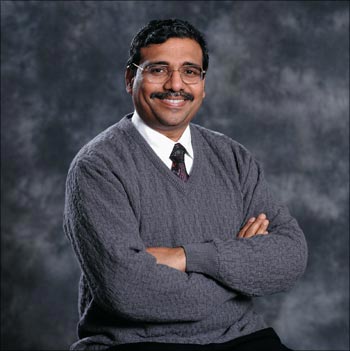
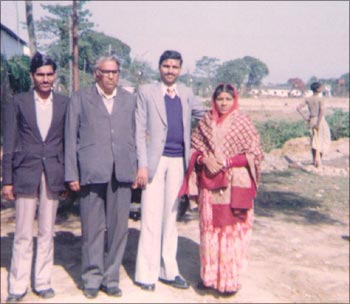



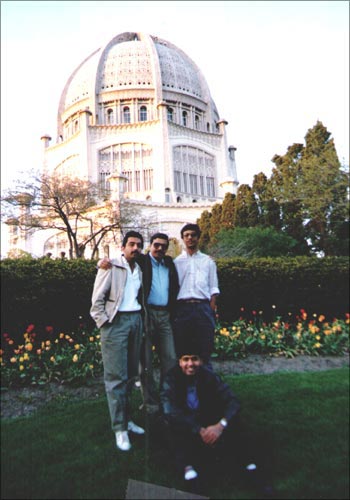
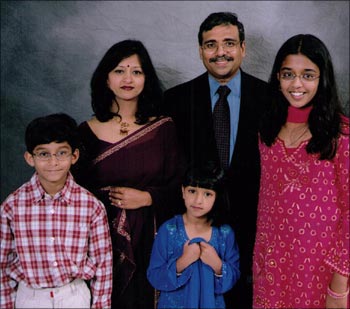
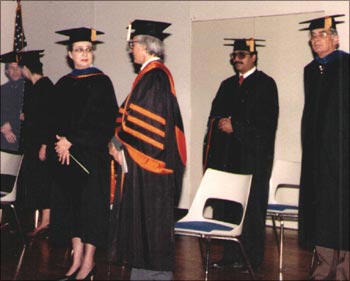
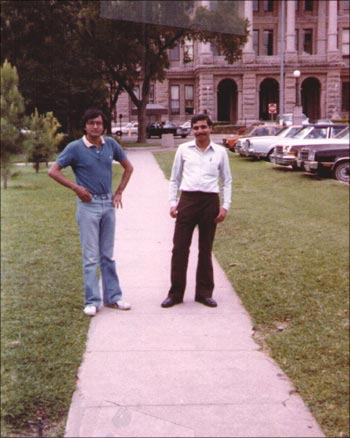
article